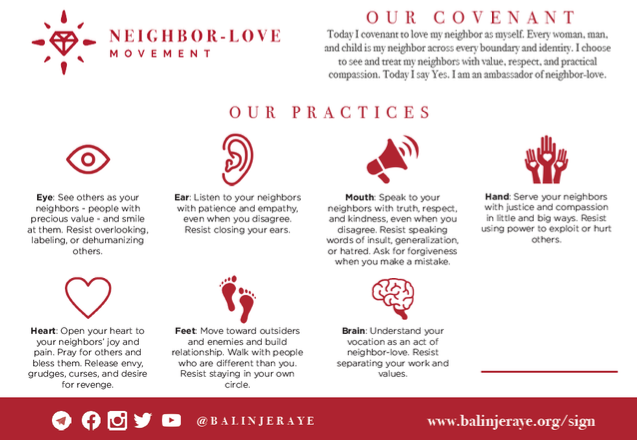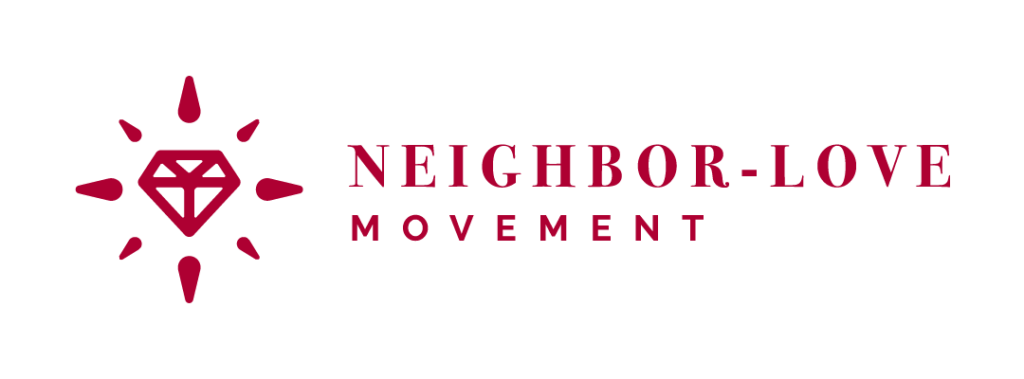Dear friends,
Last week I invited you to begin 2020 by signing the Neighbor-Love Covenant. I believe neighbor-love begins with our bodies – not ideas, money, or technology. Our bodies can be our most intimate and powerful organs for practicing a life of love for others. This week I’m starting with our eyes.
Yours with gratitude,
Andrew
How do you see others?
This simple question has occupied my mind and spread like a life-giving virus throughout my thinking. I invite you to welcome this question into your being: “How do I see others?”
The way we see others massively influences how we treat others and the kind of interactions, relationships, and cultures we create. The way we see others is the operating system for our lives as social creatures who are constantly meeting others – in our minds, online, in passing, in person.
Seeing others as neighbors is the first practice that embodies the Neighbor-Love Covenant. Neighbor-Love Ambassadors devote our eyes to being organs that recognize and welcome others as our neighbors with precious value.

We may be in a public place surrounded by complete strangers or reading a news story about people across the world. And yet we can choose to see these people as our neighbors – people with precious value, people whose lives matter equally to our own, people whose wellbeing is near to our heart.
When I walk down the street, ride a bus, enter an office, or go online, I often remind myself, “I don’t know who these people are – their names, their stories, their unique strengths and problems. But I know that they are my neighbors.” I look into their eyes and remember that I’m seeing people whose lives have precious value, even if they are unfamiliar or frustrating to me.
Through this practice, I’ve learned that it’s possible to see and treat even total strangers as neighbors: making eye-contact with them, smiling at them, allowing them to go first, expressing thanks for a service, showing patience, being in an attitude of readiness to help if a need presents itself.
I’ve also learned that it’s possible to practice my daily life and vocation as an act of seeing and treating others as neighbors. In all of my goals as a teacher, mentor, and writer, this is my most basic, permeating aim.
The way we see others produces the society we see. If we see others as cheap, we accept indifference and poverty. If we see others as worthless, we accept injustice and violence.
But if we see others as neighbors, we will and work for their wellbeing. We can no longer see others as less or unrelated to ourselves. Our seeing activates and embodies our love.
For example, imagine if the white founders of America had seen people of color as neighbors. This shift in moral vision would have had monumental implications. Slavery would have been impossible, because you can’t enslave people you see as equally precious to yourself. Neighbor-love’s eyesight leads to a passion for the other’s freedom and flourishing. It can’t coexist with humiliation, exploitation, and bondage.
This is a sobering and exciting thought-experiment: a different way of seeing others – from “property” to “neighbor” – could have changed the destiny of millions of people and the structure of society across hundreds of years. It still can today and tomorrow in small and systemic ways.
Would you pause for a moment and make a short list of people you’re tempted to see as less than neighbors? I’ve done this several times. If you think there’s no one on your list, stop and think again. We all have “others.” It could be a minority or outsider or specific kind of “sinner” or another category of people that you consciously or unconsciously see as less or unrelated to yourself. Ethnicity, religion, money, and politics are often factors, even when we believe that they aren’t.
Then gently speak to your self: “That person/people is also my neighbor. I choose to see and treat them as someone with precious value who is near to my heart.” Start learning about them. Pray for them and bless them. Build a relationship with them.
Søren Kierkegaard, perhaps the most brilliant philosopher of the 19th century, argued that identifying our neighbors is the most fail-proof act of vision because every person is our neighbor. We can never go wrong in using this lens to see the other person. Kierkegaard wrote in Works of Love, “There is in the whole world not a single person who can be recognized with such ease and certainty as one’s neighbor. You can never confuse him with anyone else, for indeed all people are your neighbor.”
No doubt, this is a very challenging way to see and live. It means that there are no people we can simply overlook, write off, or erase. Everyone shows up on our moral radar; the invisible people become visible to our eyes, including those people on our list of others. It’s easier and sometimes in our interest to erase certain categories of people and pretend like they are not neighbors. And thus we see societies with rampant poverty, violence, and other forms of injustice.
Again, the way we see others produces the society we see.
Today I invite you to take a risk and do something radical – a conversion of vision: devote your eyes to seeing others as neighbors.
Actively choose to see the precious value of the people you are most tempted to overlook, label, or erase. Make your eyes – and the eyes of your heart and mind – agents of love and justice that receive and welcome each person as a neighbor.
Just like you blink to moisturize and cleanse your eyes, let blinking become a spiritual exercise of re-opening your commitment to see others as neighbors. Let this be your operating system, your starting point, your covenant practice for how you interact, build relationships, and create culture in 2020.
Starting with your eyes, make your body an organ for covenant living:




